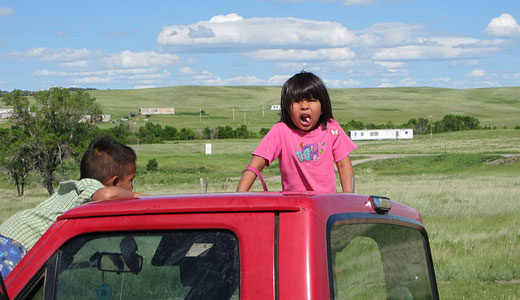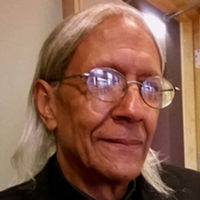
For a second time, Federal Judge Jeffrey L. Viken ruled against South Dakota’s state Department of Social Services (DSS) and attorneys for the state Feb. 19. DSS, along with the state’s attorney Mark Vargo, and Judge Jeff Davis had held hearings over the past several years that resulted in the illegal removal of thousands of Indian children from their homes and placing them in white foster homes. This is not about just a legal ruling in the latest round of battling over the state’s violation of the Indian Child Welfare Act (ICWA). This is about the halting of genocide in America.
On Friday, February 19, Viken denied South Dakota’s motion to reconsider a prior decision, holding that the state violated the ICWA and denied Native parents their constitutional rights. This ruling comes in the wake of the March 2015 ruling by the same judge in favor of the tribes in Oglala Sioux Tribe v. Luann Van Hunnik regarding the so-called emergency removal hearings in Pennington County, SD. NPR also reported on this story at the time.
This latest decision found that the state had violated not only federal law, but also the statutory ICWA code, in addition to numerous standard civil procedures, by holding the hearings.
In its motion, the state challenged Judge Viken’s findings, based on the claim that he made his ruling due to “omissions,” i.e., that Indian parents had not received relevant documents. The Indian parents saw this claim as a pettifogging stalling tactic, and the judge found the state’s arguments indicative of a “fundamental lack of competence.”
So far, South Dakota officials have not made themselves available for comment.
The class action lawsuit was filed in March 2013 by three Indian mothers and the Oglala and Rosebud Sioux Tribes to stop the ongoing abductions of Native children by DSS. Over 750 children are removed each year from their families, who are oftentimes not even told where their children have been taken.
As someone who covered this story firsthand in South Dakota in 2013, I witnessed the anguish and emotional trauma of the victimized families. It was difficult to see the terrible grief of the relatives, unable to talk without openly weeping. These are images that will stay with me forever.
On March 30, 2015, Judge Viken ordered the state to comply with the ICWA, which mandates that Indian children be placed with tribal relatives or with other tribes before non-Indian placement may even be considered. South Dakota’s DSS was not only placing Native children in white foster homes first, but was also denying Indian parents and guardians any due process rights in the hearings. Viken found that Indian families were ruled against 100 percent of the time.
What is genocide?
The United Nations General Assembly’s Convention on the Prevention and Punishment of the Crime of Genocide defines genocide in Article 2 as follows: “…any of the following acts committed with intent to destroy, in whole or in part, a national, ethnical, racial or religious group, as such:
a) Killing members of the group;
b) Causing serious bodily or mental harm to members of the group ;
c) Deliberately inflicting on the group conditions of life calculated to bring about its destruction in whole or in part;
d) Imposing measures intended to prevent births within the group;
e) Forcibly transferring children of the group to another group.”
South Dakota has been committing blatant genocide against the Sioux people in violation of subsection (e) by transferring Indian children to white homes, and also of subsection (b) amid allegations of sexual abuse and drugging of Native children in DSS foster care. This is one version of what the world has come to know as ethnic cleansing.
Over the past decade thousands of Sioux children have been removed from their homes. Aside from the racism involved, there has also been a financial motive on the part of the state: South Dakota receives $79,000 from the federal government per child per year for every Native youngster it removes, but provides only $9,000 to a white foster home. The remaining $70,000 is deposited in state coffers. In my opinion this amounts to millions of dollars of “ransom” for the kidnapping of Indian children.
The court’s February 19th ruling means that every single time that DSS has taken custody of an Indian child it has “done so in violation of the Constitution and the ICWA.”
The court will subsequently enter an order which will specify how DSS is to conduct hearings in future matters involving Native children. Many in the Native American community believe that the perpetrators of this child thievery must be punished. They feel that the best deterrent to repetition of such criminal activity is pursuit of the culprits all the way to the top, not ruling out fines and jail time.
The old maxim applies: “Justice delayed is justice denied.”
Photo: Native children outside the Wounded Knee Museum on the Pine Ridge Reservation in South Dakota.Ben Piven CC 2.0

MOST POPULAR TODAY

High Court essentially bans demonstrations, freedom of assembly in Deep South

Resource wars rage in eastern Congo, but U.S. capitalism only sees investment opportunity

U.S. imperialism’s ‘ironclad’ support for Israel increases fascist danger at home

UN warns that Israel is still blocking humanitarian aid to Gaza







Comments